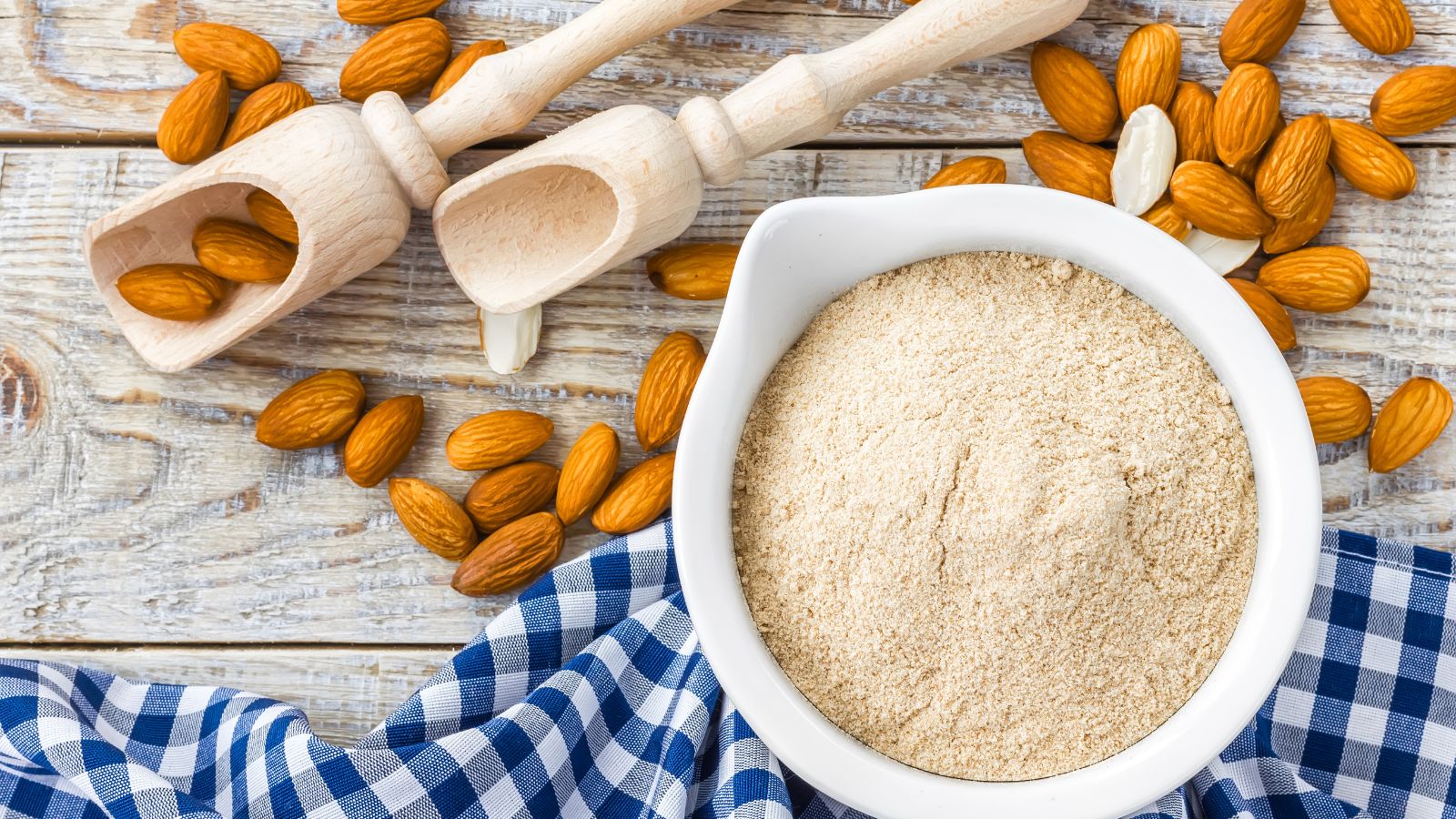
Does Almond Flour Go Bad? How to Tell & Store It Right
Photo Credit: Canva Pro
Using almond flour for low-carb and gluten-free baking is popular, but it doesn't last forever. Unfortunately, almond flour can go bad if it's not kept in the right way.
Questions as does almond flour go bad, how to tell if something is going bad, how long it lasts, and whether it's safe to use after the expiration date are all covered in this article. You can get the most out of your almond flour by learning how to store it and getting answers to common questions.
Does Almond Flour Go Bad?
Photo Credit: Canva Pro
Does almond flour go bad? Although almond flour is a great alternative to wheat flour, it doesn't last forever. This is true for almond flour, too, especially if it isn't stored properly. Bread flour and all-purpose flour take longer to spoil because they contain less natural oils and lower fat content. Checking to see if your almond flour is still good is easy.
How to Identify Spoiled Almond Flour
Having trouble deciding if your almond flour is bad? Use your senses. Opening almond flour can cause it to go bad over time, even before the expiration date. It is possible that the flour will smell or look different, or it could even change how your baked goods taste.
-
Mold growth: Look for dark spots or fuzzy areas, which means there is contamination.
-
Smell bad: If the natural oils smell sour or chemical, they may have expired.
-
Taste rancid: Your almond flour is probably not fresh anymore if it tastes bitter or sickly.
-
Hardened portions: Lumpiness could mean absorbed moisture or humidity exposure.
-
Color change: Fresh flour is usually pale. Gray or yellow colors could mean that something is going wrong.
Why Almond Flour Spoils Faster Than Regular Flour
Almond flour has a shorter shelf life than wheat flour because of its high fat content. Although it's made from ground whole almonds, the natural oils that can go bad quickly are still present.
-
No preservatives: When compared to all-purpose flour with baking powder or baking soda or self-rising flour, almond flour is more pure and sensitive.
-
Higher fat content: Oxidation happens to oils, especially when they are mixed with air or sunshine.
-
Unopened almond flour vs. opened almond flour: Unless it's kept in a cool, dark place in a sealed bag, food loses its freshness after it's been opened.
Is it okay to use expired almond flour?
Photo Credit: Canva Pro
Many people wonder if it’s safe to use almond flour past its expiration date. Luckily, almond flour that has gone bad isn't always dangerous. How it's stored and whether it shows signs of going bad affect its usefulness.
Best-By vs. Use-By – Understanding the Label
In some cases, the date printed on the almond flour packaging is not a good way to indicate the storage period. The expiration date is mostly for quality control, not safety.
-
Use senses: Prior to using, check the smell, feel, and taste.
-
Stored properly: Keeping it in the fridge or freezer in a container that keeps air out may make it last longer than expected.
-
Opened bag vs. unopened almond flour: There is a faster breakdown of opened bags, especially in a warm room or a paper bag.
When You Should Avoid Using Expired Almond Flour
Toss away almond flour that has gone bad. Using spoiled flour can ruin recipes and potentially lead to mild digestive issues.
-
Smell bad or taste rancid: This food is clearly going bad.
-
Visible mold: Immediately throw away if mold is found.
-
Unpleasant results: Expired flour may cause cakes to sink or taste off.
How long does almond flour last in a sealed container?
Photo Credit: Canva Pro
How you store almond flour has a big impact on how long it lasts. If you compare almond flour to whole wheat flour or regular wheat flour, it is more sensitive. It's very important to know how to store almond flour and how long it lasts.
Shelf Life Based on Storage Method
Where you store almond flour affects how long it lasts. Based on where and how it's kept, here's a general idea.
-
Pantry (cool, dark place): 6 to 12 months if stored in an airtight container away from heat and light..
-
Refrigerator: Up to a year if flour is kept in the right way.
-
Freezer: Up to two years if stored in an airtight container to prevent freezer burn or moisture exposure.
Best Storage Practices to Maximize Freshness
If you store your almond flour correctly, it will last longer, and you won't waste it. If you store your flour somewhere safe and dry, it won't go bad.
-
Store almond flour in an airtight container: It keeps air and water out.
-
Avoid paper bag storage: Bags made of plastic, glass, or foil should be used.
-
Label opened almond flour: To keep track of it, write down the date you opened it.
-
Freeze if not using often: the best way to store food for a long time without going bad.
Is FullyHealthy.com almond flour safe for sensitive diets?
FullyHealthy.com has almond flour options for people who have to follow strict diets. They have products that can be used instead of traditional wheat flour, self-rising flour, and coconut flour if you need to avoid gluten or follow a special plan.
If you want to know if almond flour goes bad, where you get it and how you store it are both important. If you buy flour from a reputable store like FullyHealthy, you can be more confident that it hasn’t gone bad due to improper storage or handling.
Why FullyHealthy Is Trusted by Allergen-Conscious Shoppers
The foods that FullyHealthy sells are gluten-free, AIP-friendly, and safe for people with allergies. You don't have to worry about cross-contamination or additives that might change how long almond flour lasts because you can buy it from this store.
-
High-quality sourcing: Products are carefully chosen to be pure and new.
-
Allergen awareness: Great for people with sensitive stomachs who can't eat wheat flour or other similar ingredients.
-
Shelf life info provided: The date on the package tells you how long almond flour will last.
Tips for Buying Almond Flour for Long-Term Use
To make flour last longer, you need to know how to store flour properly. If you don't use it, even the best almond flour can go bad.
-
Sealed packaging: A good sign of freshness that lasts a long time.
-
Proper storage advice: This keeps flour fresh for up to a year or even two years.
-
Store in cool places: Keeps flour from going bad because of heat or water
Final Thoughts
Does almond flour go bad? When cooking and baking without gluten, almond flour can be used in a lot of different ways. However, like all foods, it has its limits.
Do you ever wonder if almond flour goes bad? The answer is yes, especially if you don't store it right. The length of time it will last depends on where and how you store it. Always use a container that can't be opened to keep it alive. Always check to see if the flour has gone bad before you use it, whether you're cooking or baking. Your recipes will stay safe and tasty longer if you follow these easy steps.
FAQs
How long does almond flour last in the pantry?
Almond flour lasts up to 6 months in the pantry with proper care in a sealed container.
Can flour go bad in the freezer?
Yes, flour goes bad even in the freezer if not sealed properly or exposed to moisture.
What is the average shelf life of almond flour?
The average shelf life is up to a year in the fridge, up to two years in the freezer.
Does flour go bad like food?
Yes, almond flour is a food item, and like any food, it goes bad without proper care.
Can I use almond flour for cooking and not baking?
Yes, almond flour is great for cooking, baking, and anything regular flour can do.

Leave a comment